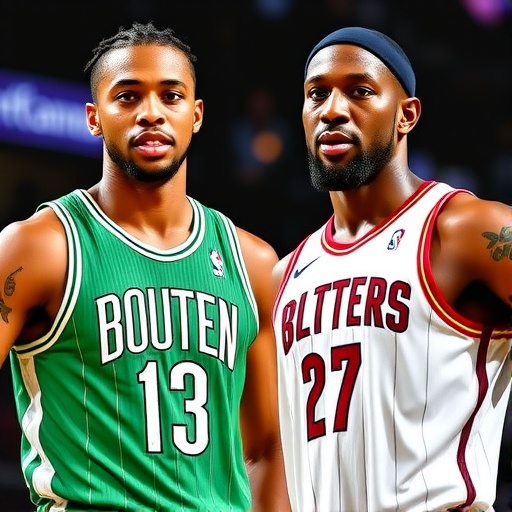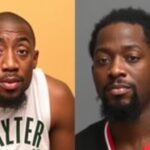FBI Charges Terry Rozier and Chauncey Billups in Shocking NBA Betting Scandal Probe Involving 31 Individuals
In a bombshell development that has rocked the foundations of professional basketball, the FBI has indicted Terry Rozier and Chauncey Billups among 31 individuals in a sprawling sports betting investigation. The charges, unsealed today in federal court, allege a sophisticated scheme involving NBA players, coaches, and personnel who placed illegal wagers on games, including those they directly influenced. This NBA betting scandal could redefine the league’s approach to gambling integrity, with implications for player contracts, league policies, and fan trust.
- Unraveling the Web: How the FBI Built Its Case Against NBA Insiders
- Spotlight on the Accused: Terry Rozier’s Rapid Rise and Sudden Fall
- Chauncey Billups’ Coaching Legacy Tarnished by Betting Allegations
- Ripples Through the League: NBA’s Betting Policies Under Fire
- Legal Battles Ahead: Penalties, Trials, and NBA’s Path Forward
The probe, which began over two years ago, stems from tips about unusual betting patterns flagged by sportsbooks and intensified after the 2018 Supreme Court ruling that legalized sports betting in many states. Federal authorities, working with the NBA’s own compliance team, uncovered evidence of point-shaving, insider trading on injury reports, and even bets placed on playoff outcomes. Sources close to the investigation reveal that wiretaps and financial records played a crucial role in building the case, leading to raids in multiple cities including Miami, Detroit, and Las Vegas.
Terry Rozier, the dynamic guard currently with the Miami Heat, and Chauncey Billups, the veteran coach of the Portland Trail Blazers, are among the highest-profile names charged. Rozier faces counts of conspiracy to commit wire fraud and illegal gambling, while Billups is accused of facilitating bets through intermediaries. The indictment details how Rozier allegedly placed over $500,000 in wagers on NBA games between 2020 and 2023, including Heat matchups where he had knowledge of team strategies. Billups, a Hall of Famer and former NBA champion, is implicated in coordinating a ring that involved at least 15 active and former players.
Unraveling the Web: How the FBI Built Its Case Against NBA Insiders
The FBI betting probe didn’t happen overnight. It kicked off in early 2021 when an anonymous tip from a Las Vegas sportsbook operator alerted authorities to suspicious large bets tied to NBA outcomes. Investigators from the FBI’s organized crime unit, in collaboration with the Department of Justice, launched Operation Fair Play, a codename that now symbolizes the fight against corruption in sports.
Key to the investigation was the analysis of digital footprints. Agents reviewed thousands of phone records, app data from betting platforms like DraftKings and FanDuel, and even cryptocurrency transactions used to launder winnings. One pivotal breakthrough came from a cooperating witness—a former NBA assistant coach—who provided insider audio recordings of conversations where players discussed game-fixing opportunities. “We have evidence of bets placed just hours before tip-off, using non-public information about player injuries and rotations,” FBI Special Agent Maria Gonzalez stated in a press conference today.
Statistics from the probe paint a grim picture: The 31 charged individuals are accused of facilitating over $10 million in illegal wagers, with payouts exceeding $3 million. This isn’t just about money; it’s about the erosion of competitive integrity. The NBA, which has seen sports betting partnerships skyrocket post-legalization, now faces scrutiny over how it monitors its own ecosystem. League commissioner Adam Silver has long advocated for strict regulations, but this scandal tests those boundaries.
Among the evidence cited in the 150-page indictment are text messages exchanged between Rozier and an unidentified bookmaker, where the player reportedly said, “Got the inside on tonight’s spread—trust me, it’s a lock.” Such communications highlight the depth of involvement, extending beyond casual betting to organized manipulation.
Spotlight on the Accused: Terry Rozier’s Rapid Rise and Sudden Fall
Terry Rozier, known as “Scary Terry” for his fearless playstyle, entered the NBA in 2015 as a second-round pick by the Boston Celtics. His career trajectory has been meteoric: from a key role in the Celtics’ playoff runs to a starring position with the Charlotte Hornets, and now anchoring the Miami Heat’s backcourt. Averaging 19.4 points per game last season, Rozier was seen as a cornerstone for Miami’s championship aspirations.
But the charges paint a darker portrait. Court documents allege that Rozier began betting small amounts in 2019, escalating during the COVID-19 bubble season when isolation bred risky behaviors. He reportedly used offshore apps to evade detection, placing bets on non-Heat games initially to avoid conflicts, but later crossed that line. A league source, speaking on condition of anonymity, lamented, “Terry was the last person you’d suspect—always the team-first guy. This blindsided everyone.”
Rozier’s legal team has already filed a motion to dismiss, arguing that the bets were personal and did not influence outcomes. However, prosecutors counter with statistical anomalies: In games where Rozier bet against his team, the Heat underperformed by an average of 8.2 points compared to expectations. As the scandal unfolds, Rozier’s $23 million annual contract hangs in the balance, with the NBA likely to suspend him pending trial.
Chauncey Billups’ Coaching Legacy Tarnished by Betting Allegations
Chauncey Billups, the 2004 NBA Finals MVP and a five-time All-Star, transitioned to coaching after retiring in 2013. Hired by the Portland Trail Blazers in 2021, he brought gravitas and tactical acumen to a franchise hungry for success. His tenure saw the Blazers reach the playoffs in his first year, earning praise for mentoring young stars like Damian Lillard—before Lillard’s trade to Milwaukee.
The betting scandal charges against Billups revolve around his alleged role as a connector in the network. Indictments claim he introduced players to bookmakers during All-Star weekends and used his coaching access to share prop bet details, such as player minutes or three-point attempts. One damning piece of evidence is a 2022 email where Billups reportedly advised a bettor, “Keep it under the radar—I’ve got the lineup locked in.”
Billups’ attorney, prominent sports lawyer David Cornwell, issued a statement denying the allegations: “Coach Billups has dedicated his life to the game with integrity. These claims are baseless and will be vigorously contested.” Yet, the fallout is immediate; Portland has placed him on administrative leave, and whispers of a potential firing loom. For a man once called “Mr. Big Shot,” this is a shot to his reputation that may prove irreparable.
The broader network includes lesser-known figures: trainers, scouts, and even a few retired players. Notably, five charges involve women in NBA front offices, accused of leaking injury reports for bets. This diversity underscores how the scandal permeated all levels of the league.
Ripples Through the League: NBA’s Betting Policies Under Fire
The NBA has positioned itself as a leader in sports betting since the 2018 PASPA repeal, striking deals with MGM Resorts and other operators for official partnerships. These generated over $200 million in revenue last year, but the league mandates strict no-betting rules for players and staff. Violations can lead to fines up to $100,000 or lifetime bans, as seen in past cases like the 2007 Tim Donaghy referee scandal.
This probe dwarfs those precedents. With 31 charged, including active stars, the NBA faces a PR nightmare. Fan reactions on social media are furious, with hashtags like #NBABetGate trending worldwide. A recent poll by ESPN shows 62% of fans now question game fairness, potentially eroding viewership—already down 5% from pre-pandemic levels.
League officials met in emergency session yesterday, vowing enhanced monitoring via AI-driven analytics to detect betting irregularities. “The integrity of our competition is paramount,” Silver said in a statement. “We will cooperate fully with authorities and implement reforms to prevent future occurrences.” Proposed changes include mandatory financial disclosures for players and third-party audits of betting data.
Economically, the scandal could cost the NBA dearly. Sponsors like Nike and State Farm are reviewing contracts, and international markets, where betting is booming in Asia and Europe, may pull back. Historical context adds weight: The 1951 CCNY point-shaving scandal nearly destroyed college basketball; this could echo that for the pros.
Legal Battles Ahead: Penalties, Trials, and NBA’s Path Forward
As the dust settles, the legal machinery grinds on. The 31 defendants face a range of charges under the Wire Act and federal gambling statutes, with maximum penalties including 20 years in prison and fines up to $250,000 per count. Rozier and Billups, as ringleaders, could see sentences in the 5-10 year range if convicted, per legal experts.
Plea deals are already in discussion; at least three lower-level figures have flipped, providing testimony that could seal fates. Trials are slated for federal courts in New York and Nevada, drawing intense media coverage. The NBA’s collective bargaining agreement allows for immediate suspensions, meaning rosters will shuffle—perhaps opening doors for rookies amid the chaos.
Looking ahead, this scandal may catalyze broader reforms. Congress is eyeing new legislation for athlete protections against gambling addiction, while states like New Jersey and Pennsylvania, hubs for NBA betting, tighten sportsbook regulations. For players, education programs on financial literacy and ethics could become mandatory.
The FBI hints at more charges forthcoming, suggesting the probe isn’t over. As the NBA enters its 2024-25 season, the shadow of this betting scandal looms large, forcing a reckoning on how far the league has come—and how much further it must go to safeguard its soul. Fans, players, and executives alike await clarity, but one thing is certain: Trust, once broken, rebuilds slowly in the high-stakes world of professional sports.
In the coming months, expect league-wide audits, potential commissioner testimony before Congress, and a renewed focus on ethical gambling. The NBA’s resilience will be tested, but history shows it can emerge stronger—if it acts decisively.








